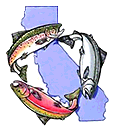Reconnecting with Resilience
April 19 - 22, 2022
California Environmental Flows Framework Workshop
20 April 2022
9:00am - 2:00pm
Workshop Coordinators: Ted Grantham, Dept. Environmental Science, Policy, and Management, UC Berkeley; and Julie Zimmerman, The Nature Conservancy, and Kris Taniguchi-Quan, Ph.D., Southern California Coastal Water Research Project
The California Environmental Flows Framework (CEFF) is a management approach to efficiently develop environmental flow recommendations for California’s rivers. CEFF is structured in three sections: First, statewide models are used to estimate ecological flow needs based on the natural ranges of functional flows for every stream reach in California. Second, these flow needs can then be revised at watershed or local scales, taking into account non-flow impairments, specific ecological objectives, and available data from site-specific studies. The outcome of the first two sections of CEFF are ecological flow criteria—quantifiable metrics that describe ranges of flows that must be maintained within a stream and its margins to support the natural functions of healthy ecosystems. The third section outlines a process for addressing non-ecological flow needs and developing environmental flow recommendations that take human uses and other management objectives into consideration. This workshop will provide an overview of CEFF, introduce technical tools that were developed to support CEFF implementation, and highlight case study applications that are completed or underway. The workshop will include presentations and interactive elements and will be oriented towards practitioners working to assess and protect environmental flows in California’s rivers and streams.
The California Environmental Flows Framework (CEFF) is a management approach to efficiently develop environmental flow recommendations for California’s rivers. CEFF is structured in three sections: First, statewide models are used to estimate ecological flow needs based on the natural ranges of functional flows for every stream reach in California. Second, these flow needs can then be revised at watershed or local scales, taking into account non-flow impairments, specific ecological objectives, and available data from site-specific studies. The outcome of the first two sections of CEFF are ecological flow criteria—quantifiable metrics that describe ranges of flows that must be maintained within a stream and its margins to support the natural functions of healthy ecosystems. The third section outlines a process for addressing non-ecological flow needs and developing environmental flow recommendations that take human uses and other management objectives into consideration. This workshop will provide an overview of CEFF, introduce technical tools that were developed to support CEFF implementation, and highlight case study applications that are completed or underway. The workshop will include presentations and interactive elements and will be oriented towards practitioners working to assess and protect environmental flows in California’s rivers and streams.

